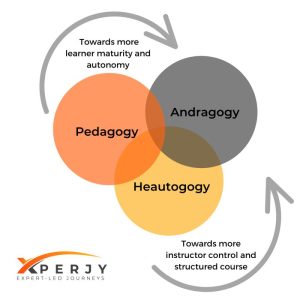
Pedagogy, Andragogy and Heutagogy are three theories of learning that are used to understand how people learn and how to design educational programs that support effective learning:
#Pedagogy is the traditional approach to teaching, which is based on the assumption that the teacher is the source of knowledge and the student is passive in their learning.
#Andragogy, on the other hand, is a more adult-centered approach that recognizes that adults have unique learning needs and preferences.
#Heutagogy is a more recent theory that focuses on self-determined learning and places the learner at the center of the learning process.
While these theories represent distinct approaches to learning and teaching, they also overlap with each other and can be combined in various ways to create effective training programs.
For example, a traditional pedagogical approach that emphasizes lecture-based teaching may be supplemented with andragogical elements such as group work and problem-based learning activities that are more engaging for adult learners.
Similarly, a heutagogical approach that emphasizes self-determined learning may include pedagogical elements such as structured assignments and assessments to ensure that learners are making progress towards their learning goals.
⚡ At #XPERJY, we utilize a blended approach as we found out that it works best for technical interdisciplinary training programs. The pedagogy approach can be used to provide the learners with a solid foundation of knowledge and skills, while the andragogy/heutagogy approach can be used to support learners in applying their knowledge and skills in a real-world setting and to work in teams. Indeed, the exact approach varies based on the training subject, clients’ knowledge gap and end goals.


